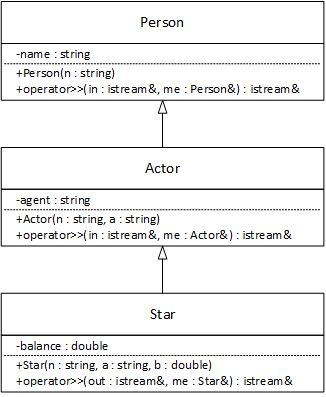| Person |
friend ostream& operator<<(ostream& out, Person& me)
{
out << me.name << endl;
return out;
}
|
 |
|---|---|---|
| Actor |
friend ostream& operator<<(ostream& out, Actor& me)
{
out << (Person &)me << " " << me.agent << endl;
return out;
}
|
|
| Star |
friend ostream& operator<<(ostream& out, Star& me)
{
out << (Actor &)me << " " << me.balance << endl;
return out;
}
|

ostream reference. Therefore, the compiler matches a function call to the corresponding function based on the second parameter (i.e., the right-hand operand).
A Star is an Actor and an Actor is a Person. So, a Star object has a balance and, by inheritance, an agent and a name. If a program prints a Star object, it should print all three data members. However, the inherited members are private in the superclasses, and the Star object can't access their members directly; it must use their public interfaces, specifically operator<<. Calling the superclass inserter requires converting a subclass object to a superclass. For example, an Actor is a Person by inheritance, so converting an Actor to a Person makes sense.
| Class | Function Signature | Casting To Superclass |
|---|---|---|
| Person | friend ostream& operator<<(ostream& out, Person& me) | N/A |
| Actor | friend ostream& operator<<(ostream& out, Actor& me) | (Person &)me |
| Person | friend ostream& operator<<(ostream& out, Star& me) | (Actor &)me |
The casting operations form expressions converting a Star reference to an Actor reference and an Actor reference to a Person reference, but they don't alter the values saved in me. The expressions have statement scope, and the program discards their effect when the statement ends. Following the cast, the expressions match the second or right-hand operand of the << operator (i.e., the expression matches the second parameter in the superclass operator<< function).
